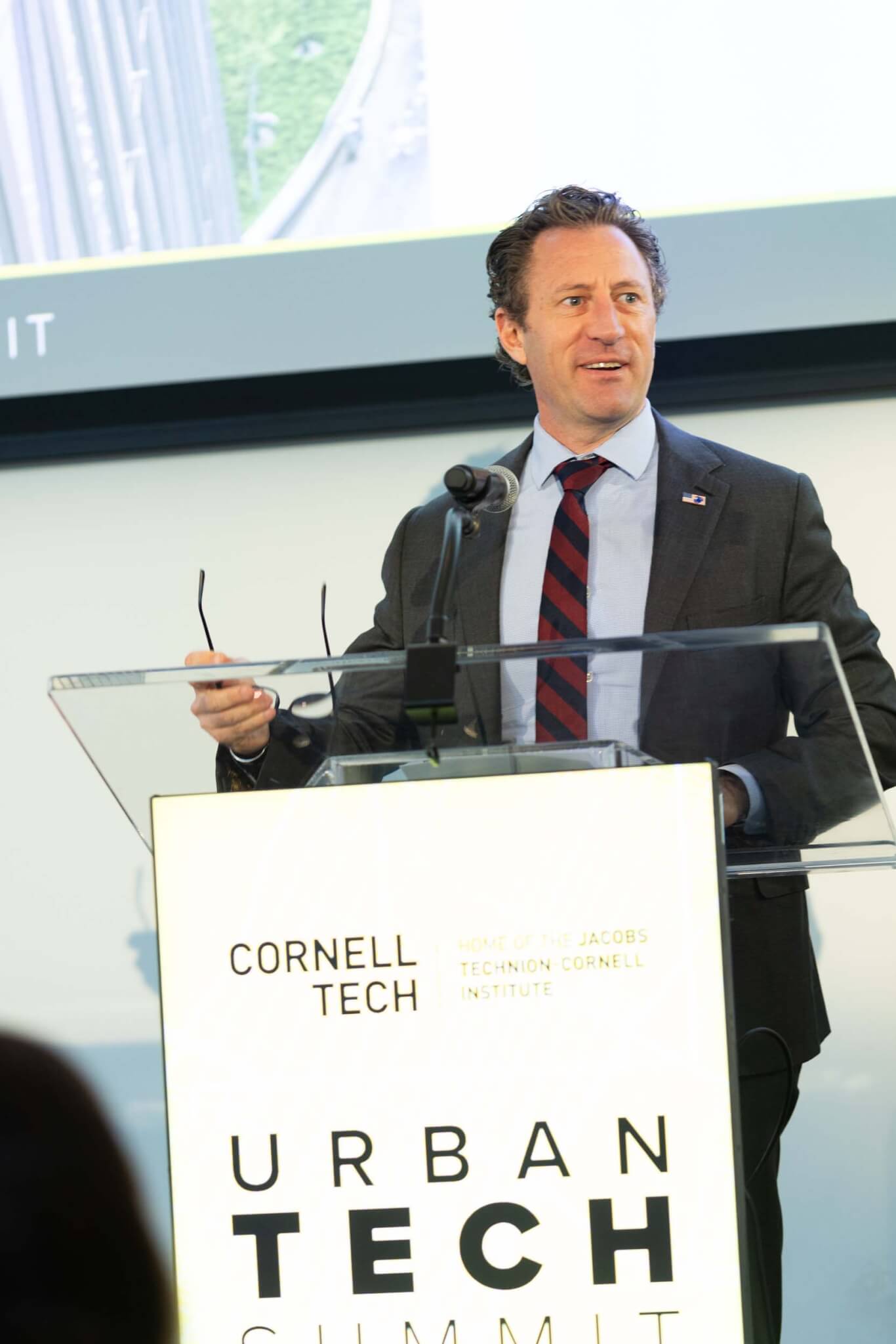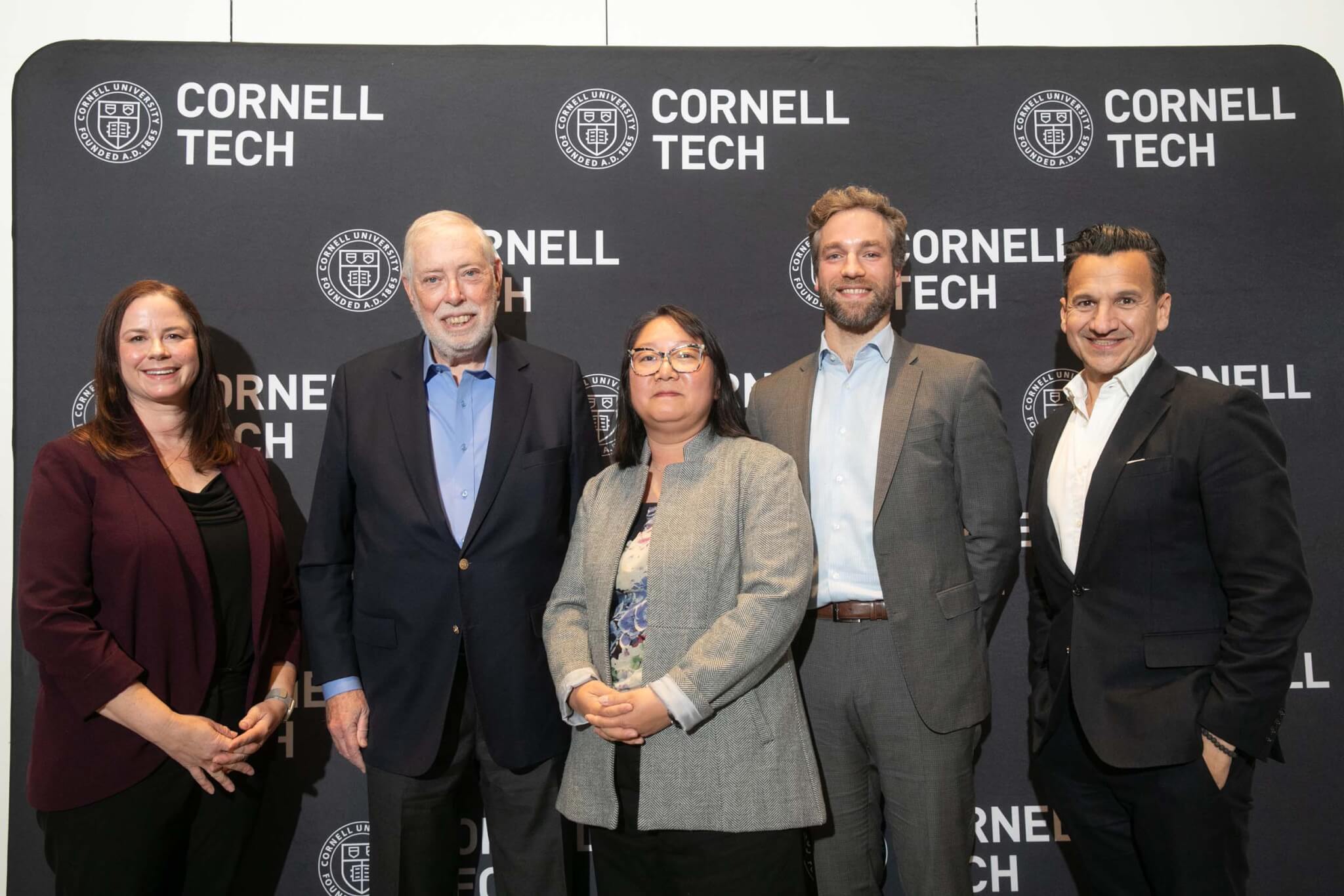The 2025 Urban Tech Summit, November 11–12, picked up where it left off last year, bringing together “hundreds of thinkers, doers, and advocates” dedicated to helping cities adapt to a changing climate with new technologies. Guided by Urban Tech Hub founding director Michael Samuelian and co-producer and founder of CIV:LAB Simon Sylvester-Chaudhuri, the summit continues to promote forward-looking discussions that define the paradigm shift we are living in.
As we immersed ourselves in keynotes, panels, networking breaks, workshops, and lightening pitches during the two-day gathering, there were infinite ways to engage with this visionary ecosystem and its mission to foster urban innovation by leveraging transformative research for real-world, civic impact. Moreso than last year, the arc of a maturing start-up culture within the Tech Hub—rooted in deep partnerships, AI-enabled workflows, piloting, outreach and exchange—was made manifest as thought leaders, urban fellows, entrepreneurs, and policymakers convened.
Organized this year around four themes: “Build,” “Power,” “Boost,” and “Move,” the summit has become an agent of actionable solutions for our vulnerable population unknowingly reliant on the application of distinctively Urban AI for climate adaptation. This extraordinary phenomenon is being led by a growing consortia of technologists who are simultaneously democratizing access through agency relationships that fast-track adoption and public deployment—reinforcing New York City’s reputation as a leader in developing the resilient future of cities. As Sylvester-Chaudhuri best expressed, “This isn’t an event that is just about thinking and talking, it’s grounded in building and building together.” Dean and Vice Provost of Cornell Tech Greg Morrisett kicked off Day 1 with a brief reflection on the 5-year-old program and explanation of this year’s themes.
National nonprofit Terreform ONE’s executive director Mark Chambers, along with professor and cofounder, Mitchell Joachim, set a positive tone in their opening keynote as they described a “multi-species” design approach in which crickets and butterflies are clients, everything in life can be biodegradable, landscape could be the new data center, and joy is the best mechanism for combating human extinction.
Bryan Boyer, faculty director of University of Michigan’s Urban Tech degree program, afterwards moderated “What’s Next for Construction Automation?”. The panel featured Cornell professor Jenny Sabin of Jenny Sabin Studio; Alexandra Donovan, director of Design and Innovation at Assembly OSM; and Val Tzvetkov, director of Emerging Technology at Skanska—all professionals uniquely engaged in revolutionizing urban construction tech for climate defense, resilient buildings and infrastructure. Provocative tangents around agent-based design, supply chain, the value of “productive failure” in transdisciplinary research, drone piloting, and cross-digital literacy surfaced. From its first panel, the summit postulates that shared vision, shared risk and public trust are critical variables in accelerating transformation.
Out of Harvard, cofounder Raphael Kay, pitching for Mireta Urban Dynamics, filled the advisory gap with biology-inspired AI tools designed to help developers and governments plan cities with cost efficiency. Using nature (slime molds and microscopic sea creatures) as a means to study urban networks, Kay quickly explained how algorithms inspired by biological growth support strategic redundancy and connectivity in city systems. As Samuelian stated, “The Urban Tech Summit shines a bright light on new ways of thinking.” Brilliant pitches throughout the day by Stacks + Joules, UrbanMix, COMCODE, Switchbox, Brick, and Atomic Canyon provide convincing examples.

Greg Lindsay’s moderation of “Digital Twins for Adaptation” led the urban resilience conversation into new directions concerning shock response, governance, workforce training standards, procurement, and scalability. From the impacts of legacy systems to the fallacies of the cloud, catastrophe motivates how industry learns—suggesting that urban adaptation in many ways is part of a larger existential conversation. Leigh-Ann Buchanan, President and CEO of Miami-Dade Innovation Authority, brought it all together in a fresh language of social investment: AI optimization is part of service delivery and “cities need platforms and civic operating systems” in order to accelerate innovation and improve the human condition. Programming for the summit was extremely successful in capturing the social and psychological dimensions of urban AI’s public-private mandate, with feel-good representation from every corner of the globe.
Day 2 began where Jerry Hultin, chairman and cofounder of Global Futures Group, left off the previous day in his closing keynote: the industrial model of cities is obsolete and “something new is coming.” Professor Israel Cidon, director of the Jacobs Technion-Cornell Institute, spoke passionately about the dual master’s degree program in Urban Tech for context, particularly the growth of students into founders of startups who “come back.” He also described, as suggested by Buchanan, research in service of the city as he touched on the Urban Innovation Fellows program in his Opening Remarks. The program is an important manifestation of the hub’s unique model of incubation that spurs agency innovation in housing, transportation, water, building decarbonization, sanitation, economic development, and procurement, from the inside out.

Commissioner Zach Iscol, of New York City Emergency Management, provided clarity around the daily impacts of climate change across the boroughs in his visceral keynote, touching on the realities of tidal flooding, extreme heat, social vulnerability and forecasting based on patterns often discovered by drones. In “Building the Urban Tech Ecosystem: Scaling Emerging Technologies and AI for Cities,” Jonathan Schulhof, NYCEDC’s executive vice president of Innovation Industries, along with Michelle Brechtelsbauer, Beth Porter, and Alex Mitchell, discussed how Newlab, C10 Labs, BATWorks, and Los Angeles Cleantech Incubator are nurturing the local ecosystem in exciting ways. Mitchell’s acknowledgement of the importance of outcomes relative to piloting emphasizes a build-test-scale mindset that can help solve real problems for real people. Elevating operators into the conversation is an unexpected feature of the summit. Additionally, venture platforms like Newlab are transforming core industrial sectors in a complimentary way by helping startups commercialize—from Brechtelsbauer, there is much to learn.

Panels throughout Day 2 continued to be thoughtfully curated, covering topics ranging from risk management, multi-stakeholder coordination, congestion pricing, and guardrails to an entertaining and equally controversial debate concerning the future of autonomous vehicles in the city. Ariel Noyman’s pitch for TravelAgent, a novel “agentic simulation platform” that makes the perception of cities both predictive and accessible, also stood out.
Workshops consistently allowed for deeper dives over the two-day period where pitches explored new avenues of application. Cornell Tech senior research associate and moderator Anthony Townsend led “Managing the Risks of Urban AI,” a panel featuring Jacqueline Lu of Helpful Places; Daniele Quercia of Nokia Bell Labs Cambridge, and Jiahao Chen director of AI and Machine Learning at the NYC Office of Technology and Innovation. For me it was the summit’s best panel and highlighted the ecosystem’s fondness for security and public trust. A respondent address toward the end of Day 2 offered candid input regarding the “feasibility and fundability” of the various approaches proposed by the summit from Stacey Matlen, senior vice president of Innovation at the Partnership for NYC; and Daria Siegel, senior vice president at NYCEDC. In a closing note by Samuelian, who was actively engaged until the very end, the 9–12 months of effort wrapped in plus delta fashion, predicting a raising of the bar for the upcoming year.
A complete list of speakers and an hourly play-by-play of the densely packed program can be found here.
Allan Horton is a Brooklyn-based architect, writer, and digital creator.
→ Continue reading at The Architect's Newspaper
